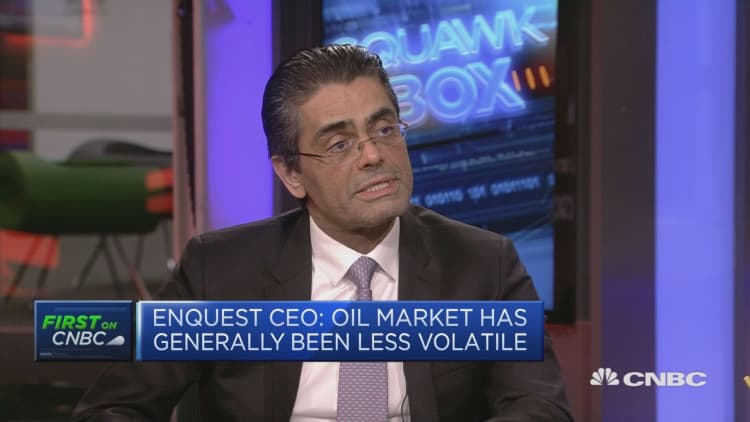Oil prices rose to their highest level in three weeks on Tuesday as tension in the Middle East and the possibility of further falls in Venezuelan output helped offset the negative impact of growing U.S. crude production.
U.S. West Texas Intermediate (WTI) crude futures ended Tuesday's session up $1.34, or 2.2 percent, to $63.40 a barrel, closing at the highest level in three weeks. The more active May U.S. crude futures rose $1.43 to $63.56 a barrel at 2:20 p.m. ET
Brent crude futures were at $67.41 per barrel, up $1.36, or 2.1 percent, around their highest level since late February.
"Geopolitics has come to the fore in today's trading session, not least because the Saudi crown prince is on an official visit to the U.S. where the issue of Iran is expected to be on the agenda," said Abhishek Kumar, senior energy analyst at Interfax Energy's Global Gas Analytics in London.
Saudi Arabia called the 2015 nuclear deal between Iran and world powers a "flawed agreement" on Monday, on the eve of a meeting between the Saudi crown prince and U.S. President Donald Trump. Both are highly critical of Iran.

Trump has threatened to withdraw the United States from the accord between Tehran and six world powers, raising the prospect of new sanctions that could hurt Iran's oil industry.
"Tensions between Saudi Arabia and Iran gave prices some support," Sukrit Vijayakar, director of energy consultancy Trifecta, said in a note.
Worries about falling production in Venezuela, whose output has been halved since 2005 to below 2 million barrels per day (bpd) due to an economic crisis, also supported oil markets.
The International Energy Agency said last week Venezuela was "vulnerable to an accelerated decline" and said such a disruption could tip global markets into deficit.
PVM's Varga said Venezuela was a potential source of supply disruption, but he said the bigger challenge for OPEC and its allies was ensuring their efforts to balance the market through output curbs was not undermined by rising production elsewhere.
Output has climbed sharply in the United States, Canada and Brazil, as they ramp up production to benefit from higher crude prices that have been buoyed by the cuts made by the Organization of the Petroleum Exporting Countries, Russia and their allies. The production rise has capped oil price gains.
Appetite for U.S. crude is adding to the headache facing OPEC. A widening discount of WTI to Brent crude makes it more attractive for foreign refiners to process U.S. oil. Brent is the benchmark for several Middle East and other global crudes.

"Spot Brent crude oil prices averaged $3.36 per barrel more than WTI prices in 2017 compared with just $0.40 per barrel more in 2016, providing a price incentive to export U.S. crude oil into the international market," said Matt Stanley, a fuel broker at Freight Investor Services International in a note.
The premium of Brent crude to WTI rose above $4 a barrel on Tuesday, its widest in a month.
Market participants will look to data from industry group the American Petroleum Institute to provide further indications of U.S. supply. Analysts expect the data, scheduled to be released at 4:30 p.m. ET, to show that U.S. crude inventories rose for the fourth straight week.
Gasoline futures on the New York Mercantile Exchange rose 2.3 percent in Tuesday's session to a high of $1.9687 per gallon, having hit their highest since August 2017.
Data from market intelligence firm Genscape showed gasoline inventories in the New York harbor region fell by about 1.1 million barrels last week, traders who saw the data said.
— CNBC's Tom DiChristopher contributed to this report.

